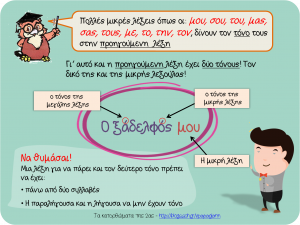Difference between revisions of "Language/Modern-greek-1453/Grammar/Words-with-2-accents"
m (Quick edit) |
m (Quick edit) |
||
| Line 17: | Line 17: | ||
* άνθρωπός μου (two accents, enclose accent) | * άνθρωπός μου (two accents, enclose accent) | ||
If you have a word the is not a '''proparoxytone''' then no extra accent is used. | If you have a word the is not a '''proparoxytone''' then no extra accent is used. | ||
| Line 33: | Line 31: | ||
* | * | ||
== | <span link>Finish this lesson and explore these related pages:</span> [[Language/Modern-greek-1453/Grammar/Verb-To-Be|Verb To Be]], [[Language/Modern-greek-1453/Grammar/The-predicate|The predicate]], [[Language/Modern-greek-1453/Grammar/Accentuation|Accentuation]] & [[Language/Modern-greek-1453/Grammar/Future-Tense|Future Tense]]. | ||
==Other Lessons== | |||
* [[Language/Modern-greek-1453/Grammar/The-combinations-«αυ»-and-«ευ»|The combinations «αυ» and «ευ»]] | * [[Language/Modern-greek-1453/Grammar/The-combinations-«αυ»-and-«ευ»|The combinations «αυ» and «ευ»]] | ||
* [[Language/Modern-greek-1453/Grammar/Adjectives|Adjectives]] | * [[Language/Modern-greek-1453/Grammar/Adjectives|Adjectives]] | ||
| Line 43: | Line 42: | ||
* [[Language/Modern-greek-1453/Grammar/The-degrees-of-the-adjective|The degrees of the adjective]] | * [[Language/Modern-greek-1453/Grammar/The-degrees-of-the-adjective|The degrees of the adjective]] | ||
* [[Language/Modern-greek-1453/Grammar/Punctuation|Punctuation]] | * [[Language/Modern-greek-1453/Grammar/Punctuation|Punctuation]] | ||
<span links></span> | |||
Latest revision as of 23:30, 26 March 2023
When do we put two accents on certain words?
No word has two accents by default. This only happens if the word is a proparoxytone word (meaning that the accent is on the antepenultimate syllable) and it is followed by the short form of a possessive pronoun : μου, σου, του, μας, σας, με, τους, το, την, τον. Single-syllable words always spoken closely with the previous word are called "enclitics" and that's why their accent is not lost, but is transferred to the end of the previous word.
For example:
- το τετράδιό μου (my notebook),
- ο πρόεδρός μας (our chairmen),
- χάρισμά σου (your gift),
- άφησέ το (leave it),
- απομάκρυνέ τον (keep it away),
- απόδωσέ του το 'give it to him), etc.
- άνθρωπός μου (two accents, enclose accent)
If you have a word the is not a proparoxytone then no extra accent is used.
E.g. : Η βαλίτσα του είναι πολύχρωμη
His suitcase is colorful
- Του ανθρώπου μου
- from my man: 1 accent, because the word is paroxyton
(1 τόνος, αφού η λέξη τονίζεται στην παραλήγουσα).
Finish this lesson and explore these related pages: Verb To Be, The predicate, Accentuation & Future Tense.
Other Lessons[edit | edit source]
- The combinations «αυ» and «ευ»
- Adjectives
- Pronouns
- Direct and indirect speech
- Syllabification
- The spelling of the verbs (–λλ or –λ)
- Homonyms and homophones
- The degrees of the adjective
- Punctuation
